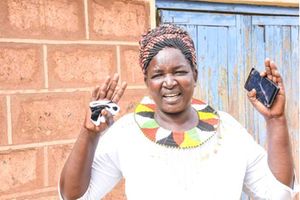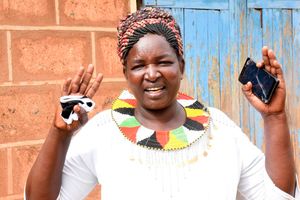
Patrick Naweet follows the proceedings of his murder case in court in January 2022. Inset: The late Elizabeth Ekaru.
A Meru High Court has sentenced a security guard to a 30-year jail team after it found him guilty of the brutal murder of a human rights activist two years ago.
Judge Edward Muriithi ruled that Mr Patrick Naweet intended to kill Ms Elizabeth Ekaru, when he stabbed her several times on the back, cheek, thighs, forearm and palm with a dagger.
The judge said Mr Naweet knew that the brutal manner in which he attacked the 49-year-old activist would either cause Ms Ekaru grievous harm, or kill her.
He dismissed the 50-year old’s explanation that he stabbed the deceased in self defence, citing the nature of the deep multiple stab wounds, one of which was 21- centimeter deep.
Justice Muriithi ruled that prosecution had proved beyond doubt that Mr Naweet planned to kill Ms Ekaru when he lured her from a friend’s home at Kambi ya Garba area in Isiolo town.
The accused had approached the deceased on January 3, 2022 and asked her to show him the boundary of his plot, which was adjacent to hers.
Mr Naweet had accused the deceased of encroaching on his plot, sparking a row between the two and was about to be addressed by the local elders.
It is while at the disputed plot that Mr Naweet savagely attacked her with a long dagger, leading to her bleeding to death.
Witnesses said the gruesome murder sparked protests, with members of the public attempting to kill Mr Naweet by pelting him with stones, but was rescued by police.
Dr Mohammed Abdikadir, a medical officer at Isiolo General Hospital who conducted the post mortem said she had multiple cuts from a sharp object, and the body was covered in blood.
He said Ms Ekaru suffered a deep cut on the back, another in the thigh which was 6cm long, had a width of 10 cm and was 21cm deep.
Dr Abdikadir said another deep wound on the left thigh cut vessels to the heart, while another on the hand slashed blood vessels.
The cause of death was determined as the cutting of major blood vessels leading to excessive loss of blood.
In his defence, Mr Naweet claimed that he stabbed Ms Ekaru in the thigh to free himself after the deceased attacked him and pinned him to the ground.
He claimed that Ms Ekaru had hit him with a stone on the forehead, slapped him and lay on him while strangling him.
His lawyer Hillary Sandi blamed Mr Naweet's savage attack on his limited education background and his Turkana culture where women are supposed to be submissive.
“As a Turkana man, he could not take the slapping of a woman. He has been brought up with Turkana culture and women there are not outspoken.
“He encountered the deceased who is outspoken and an activist. This made his experience a cultural shock. The deceased was provoked to act as he acted,” he said.
However, Justice Muriithi dismissed the defence, pointing out that despite Mr Naweet not producing evidence of having been attacked, the alleged beating with a stone and a slap did not justify the brutal stabbing.
“It is multiple stabs. Deceased was stabbed without defence over a time. The hand had been cut after which she became defenceless. The attacker then had time to stab her without defence. It was a cold-blooded killing!” ruled the judge.
Justice Muriithi agreed with Principal Prosecution Counsel Eric Masila and lawyer Zaina Kombo that Mr Naweet had all along intended to kill Ms Ekaru.
“There was more than a tinge of unacceptable male chauvinism in the submission by the defence counsel, which sought to condone gender-based violence in the Turkana community.
“It was argued that the accused as a Turkana man could not fathom the audacity of a woman to stand up to him, argue with him and allegedly slap him,” reprimanded the judge.









